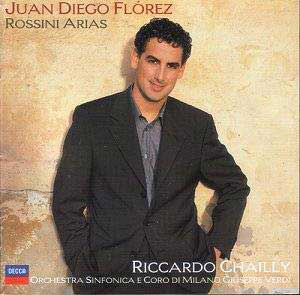Aieeeeee! One has to say that this disc will not be
to everyone’s taste; indeed, much as I love the sound of the tenor voice,
I cannot stand more than two tracks of this particular variety of it
at a time. That being a given, this ambitious solo debut recital must
be about as exciting a recording as any opera lover could imagine. Rossini
tenors are very thin on the ground at present, with only Bruce Ford
springing to mind as a singer whose high C does not make one wince,
so it is especially remarkable to be able to witness the emergence of
this young Peruvian, who, to put it simply, has it all. He is that very
rare bird, a tenor who not only makes all the notes but does so with
power to spare, and who sings not only with fluency but with shapely
phrasing and expression; just as a bonus, he is an extremely graceful
stage actor and very handsome.
This all–Rossini recital is, in itself, a daring concept,
since much of the music is, for obvious reasons, not a central part
of the repertoire, so it is laudable that Flórez chose to make
this his calling card rather than a collection of lollipops. The selection
of arias is also very well placed; it was a stroke of genius to begin
with Idreno’s Act 1 aria from Semiramide, since the very first
line here, ‘Ah, dov’è, dov’è il cimento’ allows Flórez
to display at once a tenderness in the phrasing, a mastery of tone colour,
which much of the rest of the music only encourages in short passages;
the way in which he caresses the word ‘dov’è,’ and the subtle
variations he brings to its enunciation, would be enough to mark him
out as a singer of rare gifts – and we are still on the first line.
The rest of the aria is brilliantly sung, high notes tossed off with
real bravura, but it is almost as nothing compared to the real gems
of the disc, ‘Concedi, amor pietoso’ from L’Italiana in Algeri,
and ‘Cessa di piŭ resistere,’ the often – omitted Act 2 aria from
‘Il barbiere di Siviglia.’
‘Concedi, amor pietoso’ is not the most dazzlingly
showy extract on the disc, but it is nevertheless a superb vehicle for
this singer’s gifts; it demands exceptional clarity of articulation,
consummate breath control and a sense of tender awe which must always
avoid mawkishness; Flórez achieves all this and more, his singing
of ‘Voce che tenera mi parli al core’ simply taking one’s breath away
with its mellifluousness and complete accuracy. That last term is the
real key to his special quality; tenderness, fluency, dazzling showmanship
and ability to reach spectacular high notes are all very well but they
don’t have much real impact unless the purely musical values are also
sound, and with this singer, they are just that. ‘Cessa di piŭ
resistere’ demonstrates this triumphantly; he delivers the taxing coloratura
not only with verve and with a wonderful ringing quality in the sound,
but also with complete accuracy, with nothing skimped, glossed over,
aspirated or ducked – every note is there, placed with total security
and glowing, pin-point precision. There is nothing dry about this singing,
however, and the dramatic qualities of the voice are heard to even more
advantage in his collaboration with the chorus in the aria from Zelmira,
where the singing unites passion, tenderness and agility to a remarkable
degree.
A disc composed entirely of Rossini arias, only two
of them well known, is not of automatic appeal to many opera-lovers,
but this one is something special, since it introduces a young singer
who, in John Steane’s words, achieves ‘the union of scrupulous means
and brilliantly effective ends.’ The Orchestra Sinfonica di Milano,
its associated chorus and Chailly all give him the most musical, sympathetic
and lively support imaginable; this is a recording to treasure.
Melanie Eskenazi


![]() See
what else is on offer
See
what else is on offer 